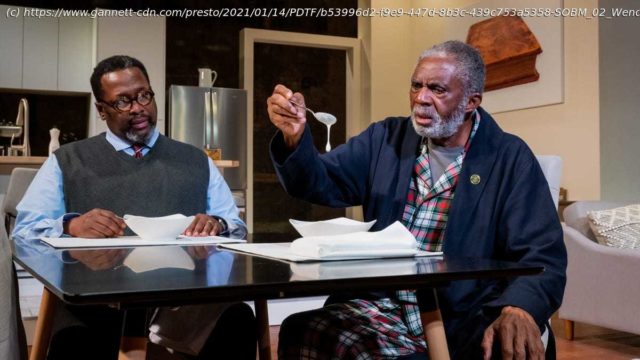UMS will premiere \
«Some Old Black Man,» a play rehearsed, directed, and filmed entirely in quarantine under COVID-19 protocols, debuted Friday online. Presented by the University of Michigan’s University Musical Society, the play starring screen and stage veterans Wendell Pierce («The Wire» and «Treme») and Charlie Robinson («Night Court»), is the society’s first foray into nonmusical production. In the play, filmed at The Jam Handy in Detroit, the two actors play a combative father and son at odds in a relationship forged by racial pressures both internal and external. Pierce summed it up: “Calvin Jones lives in a penthouse in Harlem, and brings his 82-year-old father, Donald, to live with him. The play takes place the first morning in New York after transplanting him from the fictional town of Greenwald, Mississippi. Both men are widowers; they have a history they haven’t quite worked out, and Donald is burdened by a traumatic history of their own. It’s a classic, ‘kitchen sink’ drama that takes place in real time, about two Black men coming to terms with the personal impact that racial trauma can have, how micro- and macro-aggressions deeply impact our personal lives and relationships.” The two give lived-in turns as full but flawed men. Pierce’s prickly, just-so Calvin plays it cooler, with quick, patronizing head nods, arched eyebrows, measured tone, and pregnant pauses delivering a Greek chorus of subtext in a way that is familiar to anyone of age who has ever argued with a parent. Robinson volleys off him in a roaring anchor performance as Donald, angry, deep-set eyes burning like coals as he fights to hold onto the same past that has taken everything from him. Pierce championed the script for years in various forms before pitching it to the university. When COVID-19 lockdowns began, he suggested producing it in quarantine as a case study. “It was an art and public health experiment,” he said, “aligned with material that spoke to what was happening last summer, and in many ways continues.” Pierce’s original idea involved quarantining the two-man cast and small crew to rehearse, then performing for small, live audiences of 10 to 20, with attendees being quick-tested before each show. When Gov. Gretchen Whitmer limited gathering sizes across the state of Michigan, the idea switched to preserving the show on film, as the number of cast and crew meant no people could be added to their space. Things began simply, with pre-testing before arrival in Ann Arbor, where all shared a three-story home with a rehearsal space in the basement. Coronavirus tests were also administered each day for the first week, then three times a week for the remaining period. Then, director Joe Cacaci tested positive for the virus on Oct.14 — the crew’s fourth day in the house. “I had a bad night,” Cacaci said, “and then I was tired. I don’t get tired; I’m one of those people who can work and work. A couple nights, I had difficulty breathing, but I also have asthma. Then, after three nights, my fever went up. I called the doctor and said, ‘Uh-oh, this is the beginning of the end,’ and he said, ‘Not necessarily. Take some Tylenol, let’s see if we can get the fever down.’ They rushed me out of the house.” «Some Old Black Man» originated in 2010, when young playwright James Anthony Tyler entered NYU’s dramatic writing program as a grad student. “I had never seen a play, as far as I could remember,” he said. “I had only read a few plays, as well, but I signed up for the writing program, mainly for film writing, because I grew up loving film — but I was not interested in theatre at all. I didn’t care, and didn’t want to take a class in it. It ended up being the best thing I was ever forced to do, because I got thrown into the deep end. “The first class was very casual,” he said, “just talking and getting to know each other. No lesson at all. Then, at the end of the class, the professor said, ‘Bring a 10-minute script to the next class’ — no instructions at all — and I remember being stressed out because I had no idea what I was going to do.” Inspiration struck him late that night. “Around midnight,” Tyler said, “I started thinking about my parents’ generation, and my grandparents’ generation, and the similarities of coming-of-age in Black people in America. Each generation has it a little easier than the one before, and each generation is proud to see things get better for younger people, but there’s some resentment, too. I started thinking of those things, and the father and son characters popped into my head: an educated son who travels north to become something more, and a father who didn’t have those opportunities and is shaped by his lack of them and the harshness of the time he grew up in.” During summer 2015, Cacaci, artistic director of Berkshire Playwrights Lab in Great Barrington, Massachusetts, received a copy of the play from a friend and was mesmerized by the script.
Домой
United States
USA — Cinema 'Some Old Black Man' starring Wendell Pierce connects in spite of quarantine






